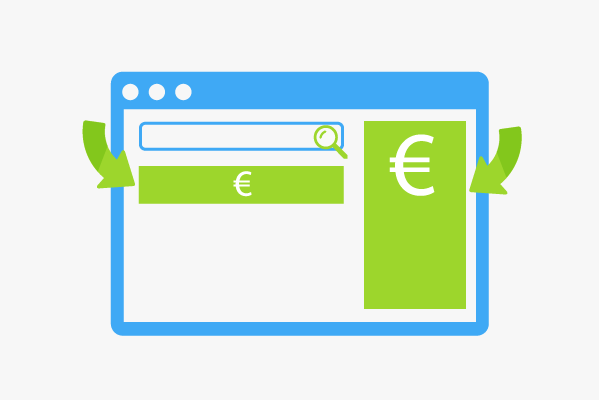Keyword Advertising
Keyword advertising is a form of advertising on the Internet and now also on mobile devices which can be booked with search engines. Ads can be triggered and displayed upon a particular search term being entered by a user. The advertiser can select the appropriate keywords and bid on them or book them in advance at fixed prices. Keyword Advertising is an important part of search engine marketing (SEM) and is comparable in principle with advertisements in print media.
General information
Keyword advertising involves the placement of text ads, sitelinks, and other micro-formats, which are displayed when you enter a key term. The results on the SERPs are usually highlighted in color and thus differ from the normal search results. Keyword advertising is also called paid search.
The aforementioned text ads are not displayed randomly in the paid search; rather, the position is previously determined by the advertiser through a bid. The highest bidder will receive the first position at the top of the paid search or top right of the screen. A high position is more likely to produce a high CTR of keyword ads, but also costs correspondingly more.
The keywords that trigger the display of an ad are defined by the advertisers through keyword targeting in advance. Relevant keywords are selected and analyzed for their probable conversion rates. Keyword targeting also includes looking into what users enter into the search engine. The principle which applies is the better the keyword research, the higher the click-through rates. Google AdWords or Bing Ads are well-known examples of keyword advertising platforms. Sometimes, these platforms own keyword tools where new terms can be found and ordered based on KPI data.
Types of features
Different billing models are used with keyword advertising. Generally, keywords can be booked either by auction or at a fixed price with the search engine advertising service. Regardless of the type of pricing, keyword advertising can be billed according to various metrics. The most common metrics are CPM (cost-per-mille), where a price is defined for 1000 visual contacts, and CPC or PPC (cost-per-click / pay-per-click), where a price is set for each individual click.
Auction
At an auction, keyword advertisers select a bid for the desired keywords. The bid determines the position of the advertisement in the search results. The highest bidder gets the highest position in the search engine paid ads listing. The price per keyword depends greatly on various factors such as the industry, competition situation, and the keyword’s quality factor.
Fixed price
If advertisement for fixed price is chosen, the keyword bookings are set for a specific time period and charged based on the contacts gained (CPM pricing model), clicks (CPC pricing model) or requests (CPL pricing model).
The cost-per-click or PPC model is most commonly used in keyword advertising. The advertiser has to pay a certain amount, which is calculated based on the actual number of clicks. When a user clicks a text ad, it is regarded a click. But a click is not necessarily someone who bought a product or a conversion. Typically, maximum amounts can be defined in keyword advertising. You can also recharge your account, so that the investment can be well controlled.
Practical relevance
In practice, keyword advertising is usually done with regard to certain websites, category pages, and product pages. However, it is also possible to bid on brand names, brands, or even competitors. This is also referred to as brand bidding. Many major websites and brands use bid management systems that automate the keyword bidding process. But this carries some risk, because although campaign control by an advertiser himself is more time consuming, it is far more focused.
Applicable law needs to be taken into account in keyword advertising. At first it was not clear whether an online shop, for example, could place ads based on a competitor brand. The law has since been clarified. Competitor brand names may be used in text ads under certain conditions.
Relevance to online marketing
Keyword advertising is one of the most effective methods of advertising on the Internet, because customers are targeted while they are actively searching for information. In addition, this form of advertising is considered cost-effective and promises high click and conversion rates. There are various ways to segment customer requests and to target specific target groups with keyword targeting.
When bidding, it is recommended to split the keywords into different areas. That way less competitive keywords and especially long-tail combinations can result in traffic and conversion without having to pay high bidding fees.
You can also distribute your keyword advertising across different search engines. This is particularly useful when the target groups are located in other countries, where other search engines are more commonly in use. A look at the market shares of Google, Bing or Yahoo in the US and Germany makes this clear.
Web Links

